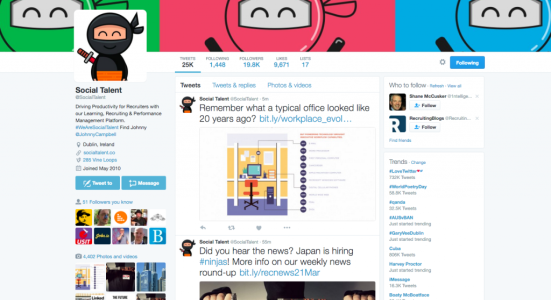Our guest blogger today is Michelle Burke from our friends at Social Talent. Read more about Social Talent at the end of this post.
By now we should all be well aware that creating a positive candidate experience is an integral part of the role of a recruiter. Without having an open line of communication with potential candidates, you run the risk of them walking away from the process with a negative opinion of your organisation. And you know what they say – have a good experience and you’ll tell one person about it; have a bad experience and you’ll tell ten. But are recruiters actually taking heed of this?
Results from our Global Recruiting Survey 2016 show that 56% of recruiters work between 36-45 hours per week on average. 54% manage less than 10 requisitions at any given time across the board (with the exception being agency workers, who tend to work more vacancies on average). The survey results also showed that the number one incentive determining a recruiter’s variable pay is the number of hires or placements made. So candidate experience isn’t necessarily a driving force – the main goal is to fill jobs fast, not to make candidates happy. However, with the recent rise of employer shaming on blogging platforms like Medium, it’s clear that candidate experience needs to be at the heart of the recruiting agenda.
The good news is that creating an excellent candidate experience doesn’t have to be a particularly time-consuming task. Today we’re going to share some of the not-so-obvious steps that you can take as a recruiter to significantly improve your candidate experience.
Share The Negative Aspects of the Job
It’s just as important to share the negative parts of the job with candidates as it is the positive ones. Claudia Nakasone, who is the Manager of Employment & Recruitment at Children’s Hospital of Orange County, California (CHOC) is a big believer in this, as she discussed in a recent podcast with Chad Harrington on The Undercover Recruiter. Speaking about her typical interview process, Claudia said: ”We want you to know what you’re getting into. Because there are some days that aren’t good. And as recruiters, we want to tell people about all of the positive things that we do, but we also have some days that aren’t good for us. That helps us as recruiters to then find out if they (the candidates) know what they are getting into, and do they want to continue going down that road.”
There is value to be taken from this by recruiters across all industries and disciplines, not just in healthcare; by being open and honest with candidates about the tough days, it will help them to understand the environment that they’ll enter if they are successful in the process, and gives them the chance to reflect on similar experiences that they’ve had in previous positions. This should, in turn, give you a better overall picture of the candidate – you’ll see how they deal with adversity. You’ll also get an idea as to why they want to continue their career in that particular industry.
Walk a Mile in the Candidate’s Shoes
Remember that every person who has applied for a position with your organisation feels that they could be the perfect fit for the job. Just as good a fit as the person who ultimately gets hired. In an open letter to recruiters, Kate Reilly aired her grievances about the lack of communication that she was experiencing on a regular basis with a piece titled 16 Tips for Improving Your Candidate Experience. She wrote:
‘I am just as interested in the job as the person who was granted an interview, so please, let me know when the job is filled. Send me a bulk message through your ATS, fine, but just give me closure and thank me for my interest and time. One recruiter blew me away when she offered to stay in touch and even help me network with recruiters at other companies. What a great way to pay it forward. I’ll never forget her or her company, and will happily send her referrals.’
Kate also gave recruiters an excellent tip when it comes to the most important question for recruiters to ask in an interview:
“Is there anything you didn’t get a chance to tell us today that you think we should know?”
‘Even if I don’t get the job, this question lets me walk away feeling more satisfied because I know I gave it my all. There’s nothing worse than feeling like I didn’t get to put my best foot forward.’
It’s vital that you can empathise with what it feels like to be a job seeker – the highs, the lows, the anxiety and the anticipation. If you can tap into this and communicate accordingly, you’ll be well on your way to creating an excellent candidate experience.
Give an Office Tour
Many organisations have a wall up when it comes to showing candidates around the office for fear that they might be ‘giving too much away’. In actual fact, by giving an office tour, you show transparency in your hiring process – that your company has nothing to hide, which should give the candidate a sense of reassurance and comfort. The benefits of giving an office tour during the interview process are three-fold:
1: Body Language
When you show a candidate around the office, you should be able to get an indication as to whether or not that individual will fit into the company’s culture. How do you do this? By reading their body language. For instance, do they walk beside you or trail behind you? Do they introduce themselves to other employees, or do they shy away? Are they asking questions along the way, or are they staying silent? All of these things are key indicators of the person’s character that you simply won’t get in an interview room.
2: Less Chance of Making a Bad Hire
By giving candidates the chance to see what a typical day at the office looks like, it helps them to make an informed decision about whether or not they really want to work there. Since one of the key metrics for any recruiter is turnover, it’s important to make sure that you’re doing everything in your power to avoid making a bad hire. Of course, bad hires can sometimes happen to the best of us no matter how many precautions we take, but by giving the candidate a chance to visualise their day to day role, you’re giving them the best food for thought in terms of deciding if your company is a good fit for them.
3: Brand Advocacy
Even if the candidate doesn’t get an offer, they should leave the interview process feeling valued. By knowing that the company puts in the effort to show each potential candidate around the office, it shows that that they take pride in their workplace. These people are far more likely to walk away with a positive image of the organisation. They are also likely to apply again should a suitable position come up, thus improving your talent pipeline.
All in all, it’s worth investing a little bit of time showing candidates around the office – it could make a huge difference to the success of your recruiting process.
Be Honest About Your Timeline
We have previously discussed how you can drastically improve your candidate experience by sticking to your timeline. But what do you do when your timeline goes off-track; for instance when you’ve told a candidate that the hiring manager should have an answer by Friday, but then that same hiring manager suddenly has to go on sick leave, throwing the process into disarray! Do you tell the candidate what’s going on, or just try to buy time instead?
You know when you’re in a restaurant and the food that you’ve ordered seems to be taking forever to come out of the kitchen, and you know that the server knows exactly what’s up but it’s as if their peripheral vision has all of a sudden disappeared… so instead of telling you that there’s a problem in the kitchen, they just completely blank you? Well yeah, NOW there’s a problem! Whereas if the server had just popped over to your table to tell you that your food was going to be delayed and apologised for the wait, chances are you would have been completely fine with that that, right? So why should recruiting be any different!
Passive Candidates Have Feelings Too
When it comes to passive candidates, the main focus seems to be on sourcing them: getting them to engage, getting them interested in your company and ultimately selling them the job. We’ve looked at ways to get into their hearts. We know how to answer their questions. But do we know how to give them an overall excellent experience?
The passive candidate experience begins when you reach out to them, not when they submit an application to you. Therefore, the onus is on you as the recruiter to follow through by giving them a positive experience throughout the entire process, not just sparking interest and walking away! Just like any other candidate, they’ve taken time out of their busy day to come into your office for an interview, not to mention spent time researching your company’s website, blog and social media platforms. Sure, this is fully expected of any candidate who is serious about taking up a position in your organisation. But let’s not forget that you are the one who did the courting – the inMailing, the phone calls, the emails, the text messages, all to get them interested in the position. So it’s absolutely vital that you follow suit when it comes to your post-interview communication. You should never think that it’s ok to let passive candidates drop off your radar for a position just because ‘they probably weren’t looking for a new job anyway.’ By letting the fact that a passive candidate has a job to fall back as an excuse for poor communication, you’re not only damaging your talent pipeline, but you could be getting into the dangerous territory of unconscious bias too.
All in all, creating an excellent candidate experience isn’t a difficult task – try taking a few of the steps that we’ve mentioned and let us know if you notice a change! Follow Social Talent on Twitter and tell us what things you’ve done as a recruiter to improve your candidate experience.
Thank you for taking the time to read my post
At Social Talent we produce content for recruiters to read, enjoy and learn from 5 days a week including ‘How to’ guides, Top 10’s, infographics, industry news and much more from the world of recruitment. So, if you feel like you’d like to read more (of course you do!), please visit socialtalent.co/blog or follow us on Twitter at @socialtalent.
If you’d like more information on our online recruitment training course, the Black Belt in Internet Recruitment, give us a ring on +353 1 524 1285 and on of our delightful team members will be there to have a chat!






